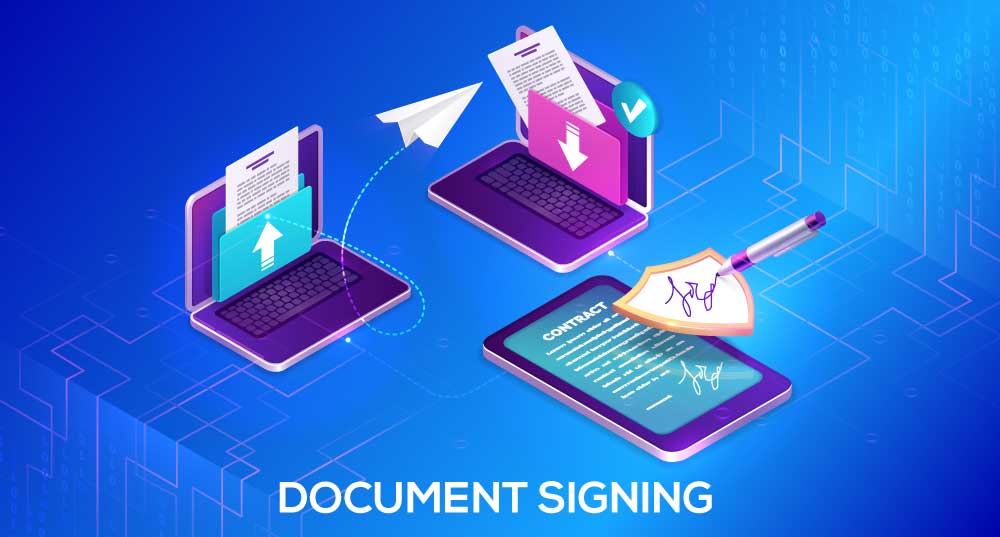Digital Signatures
In today’s fast-paced and interconnected world, the reliance on digital communication has skyrocketed. Whether it’s a business contract, a legal agreement, or a sensitive financial document, ensuring the security and authenticity of these documents has become crucial. Traditional methods of signing documents with pen and paper are no longer sufficient to meet the demands of our digital era. This is where digital signatures come into play, offering a more secure, efficient, and convenient alternative to traditional ink signatures.
Digital signatures utilise advanced cryptographic algorithms to create a unique digital fingerprint, or hash, for each document. This hash is encrypted and appended to the document, serving as a tamper-evident seal. Any alteration to the document after it has been signed will invalidate the digital signature, alerting the recipient of potential tampering. In contrast to ink signatures that can be easily forged or manipulated, digital signatures provide an unparalleled level of security, safeguarding the integrity and authenticity of the document.
Why Sign and Secure Documents?
Enhanced Security

Digital signatures provide a higher level of security compared to traditional ink signatures. They use cryptographic algorithms to create a unique digital fingerprint for each document, which is nearly impossible to forge or alter. Digital signatures ensure the document’s integrity and authenticity, protecting it from unauthorised modifications. Additionally, digital signatures can be verified using public key infrastructure (PKI), further validating the signer’s identity and ensuring that the document has not been tampered with during transmission.
Legally Binding and Compliance

Digital signatures hold legal validity in many countries worldwide, binding them in various business and legal contexts. They comply with industry-specific regulations such as eIDAS in the European Union and the Electronic Signatures in Global and National Commerce Act (ESIGN Act) in the United States. By adopting digital signatures, organisations can streamline their document signing processes while maintaining compliance with legal requirements, saving time and resources.
Cost and Time Efficiency

Implementing digital signatures reduces the need for printing, scanning, and physically transporting documents, which can be time-consuming and costly. With digital signatures, documents can be signed and exchanged electronically, significantly reducing turnaround times and eliminating the need for paper-based workflows. Digital signatures expedite business processes, improve efficiency, and accelerate decision-making, benefiting organisations and individuals.
Improved Workflow and Collaboration

Digital signatures facilitate seamless document workflows and collaboration among multiple parties. Documents can be signed anytime, removing geographical barriers and enabling remote work. Multiple signers can review and sign documents sequentially or in parallel, reducing delays and enhancing collaboration. Furthermore, digital signatures enable tracking and auditing capabilities, providing a clear record of who signed the document and when improving accountability and transparency.
Environmentally Friendly

Adopting digital signatures aligns with sustainable practices, reducing paper consumption and minimising carbon footprints. By eliminating the need for printing, storing, and disposing of physical documents, organisations contribute to the preservation of natural resources and help protect the environment. Embracing digital signatures is a step toward creating a paperless office environment, promoting eco-consciousness, and demonstrating corporate social responsibility.
Embracing Digital Signatures
Digital signatures provide secure document signing benefits, including enhanced security, legal validity, and increased efficiency. Organisations can streamline workflows, reduce costs, and improve productivity by leveraging cryptography and electronic authentication. As technology advances, digital signatures will ensure document authenticity, integrity, and security, paving the way for a more efficient, secure, and sustainable future.
WebNIC offers multiple Digital Signing Certificates services:

DigiCert is a trusted certificate authority offering digital certificate solutions, including digital signing certificates for secure email communication and code integrity verification, ensuring industry standards compliance.

Sectigo offers digital certificate solutions for securing digital transactions across industries, compatible with major software platforms and supporting various algorithms, focusing on user-friendly experiences for enhanced security.

GlobalSign is a trusted CA offering digital certificate services, including digital signing certificates, catering to individuals, enterprises, and governments. They adhere to industry standards, provide robust cryptographic algorithms, and offer features like timestamping and long-term validation.
Digicert, Sectigo, and GlobalSign are reliable digital signing certificate providers, offering various features and reputations for organisations and individuals.

